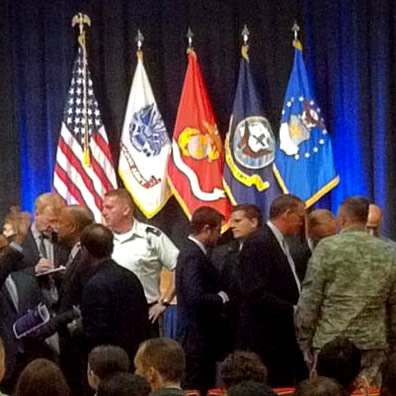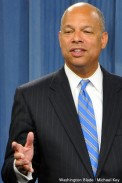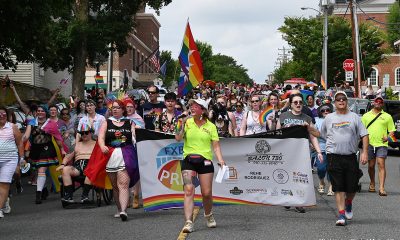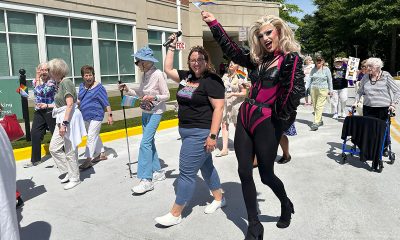National
Gay troops tell personal stories at Pentagon Pride
Event marks first such celebration since ‘Don’t Ask’ repeal

The personal story of a gay service member warmed the hearts of attendees during a panel discussion at the first ever Pentagon event celebrating June as Pride month.
Marine Corps Capt. M. Matthew Phelps, who serves as a commanding officer at the Marine Corps Recruit Depot in San Diego was among the three panelists who talked about the difficulties of serving in the closet before “Don’t Ask, Don’t Tell” was lifted.
Phelps said the situation was particularly difficult for him in 2007 when he was deployed to Iraq and fellow Marines would meet on Saturday to smoke cigars, watch movies and talk about their families at home.
“I sat there in the back of the room not talking to anybody because not only was it so hard to have left somebody at home — just like it was hard for everybody else — but when everyone was getting together and growing closer as a unit, by virtue of the fact that I wasn’t allowed to say anything, I was actually growing more distant from my unit,” Phelps said.
After graduating from the University of Rochester in November 2001 with a degree in applied music, Phelps said he enlisted in the Marine Corps after the terrorist attacks on Sept. 11, 2001, because he felt the need to serve his country. But Phelps said “Don’t Ask, Don’t Tell” was a strain on him until the ban was lifted on Sept. 20.
“I went into work on the 20th of September thinking that my life was going to change, and I went in and I sat down at my desk and I braced myself on the desk waiting for everyone to come and ask me if I was gay,” Phelps said. “Believe it or not, nobody did. I didn’t get any email. I didn’t get any phone call. In fact, the phone didn’t even ring. I was waiting — saying, ‘Please somebody talk to me today’ — because I felt like I was going to work for the very first time. For almost 10 years, Matthew was going to work as a Marine in uniform doing my job, doing the job that I thought I had been doing for 10 years, but I had only been half doing.”
Phelps was among the attendees at the White House Pride reception earlier this month where for the first time openly gay service members could participate while wearing their uniforms thanks to “Don’t Ask, Don’t Tell” repeal.
Others on the Pentagon panel, which was moderated by Pentagon Director of Press Operations Navy Capt. Jane Campbell were Gordon Tanner, the Air Force’s principal deputy general counsel, and Brenda “Sue” Fulton, a member of the board of visitors at the U.S. Military Academy at West Point and communications director for OutServe. All three panelists — Phelps an active duty troop, Tanner a civilian and Fulton a veteran — were gay and selected by word of mouth recommendations.
Tanner said he was supposed to distribute a list of benefits available to gay troops, but opted instead to encourage gay service members to serve as openly as possible because only that can help straight allies bridge their understanding of LGBT people.
“What I really want to talk about today is what each of us can do in our own day-to-day lives to make a difference,” Tanner said. “First of all, and most importantly, we need to be as visible as we can be. Everybody has a different comfort level. Everyone is in a different place. Let me encourage you to be as open and honest as you can possibly be.”
Fulton talked about the commitment she saw from straight allies in the military who wanted to make sure the transition to open service went smoothly and gay troops weren’t harmed. She described a commitment ceremony that took place over the weekend involving gay couples who served in the military.
“In the back of the church … was another chaplain, a senior chaplain Air Force O-6, Southern Baptist,” Fulton said. “I asked him why he was there and he said, ‘I just want to make sure everything goes smoothly for my airmen. I just want to make sure there aren’t any problems.'”
The one-hour event marks the first time that a Pride celebration has taken place for Defense Department personnel within the Pentagon. This is the first Pride month to have taken place since “Don’t Ask, Don’t Tell” was lifted from the books last year.
More than 350 attendees filled the Pentagon auditorium to capacity. The event was broadcast on the Pentagon channel and Tanner said during his remarks that troops as far away as Afghanistan were interested in watching a video of the event.
Attendees were made up of civilian Defense Department workers, service members who came in their uniforms and LGBT advocates who helped lead the way for “Don’t Ask, Don’t Tell” repeal. The program began after service members “presented the colors” and video messages were shown from President Obama and Defense Secretary Leon Panetta.
Delivering the keynote address at the event was Jeh Johnson, the Pentagon’s general counsel and co-chair of the Pentagon working group that wrote the report leading the way for legislative repeal of “Don’t Ask, Don’t Tell” in 2010. He spoke mostly of the process by which he and fellow co-chair Army Gen. Carter Ham, then commanding general of U.S. Army Europe, evaluated the risk of lifting the military’s gay ban.
While they pursued the task at hand without any predetermination on whether the ban should be repealed, Johnson said the group heard stories from gay service members who were eagerly awaiting an end to “Don’t Ask, Don’t Tell.”
“In communications with gay and lesbian current and former service members, we repeatedly heard a patriotic desire to serve and defend the nation subject to the same rules as everyone else,” Johnson said. “In the words of one gay service member, ‘Repeal would simply take a knife out of my back. You have no idea what it is like to serve in silence.'”
As a result of the process, Johnson said the institution of open service in the military has brought some isolated incidents, but “almost no issues or negative effects associated with repeal on unit cohesion, including within warfighting units.”
Even during his remarks, Johnson wouldn’t reveal his personal views on LGBT rights — saying he thinks as Pride is celebrated participants should remember the military is about Americans from a variety of backgrounds coming together to serve the country.
“Within the military, events such as this must occupy a different and qualified place because in the military, individual personal characteristics are subordinate to the good of the unit and the mission — service above self,” Johnson said. “From all that we learned in 2010 about the struggles and the sacrifice to remain in the military, I believe gay men and women in uniform readily agree with this.”
Johnson also said the Pentagon is examining ways to extend additional benefits to gay troops now that open service is in place. Pentagon officials have said they’ve been looking at these possible benefits since “Don’t Ask, Don’t Tell” was lifted last year.
Servicemembers Legal Defense Network and other LGBT groups have been pushing for benefits such as joint duty assignments, military family housing as well as access to certain family programs and free legal services. All are deemed by advocates to be within the authority of the Pentagon even with the Defense of Marriage Act in place.
“Going forward, the personnel and readiness community is now in the midst of reviewing which military family benefits can be extended to the partners and other family members of gay and lesbian service members,” Johnson said. “The repeal of ‘Don’t Ask, Don’t Tell’ exposes certain inequalities between similarly situated couples in the military community. This concerns many of our leaders. On the other hand, we must comply with current law, including the Defense of Marriage Act.”
Aubrey Sarvis, SLDN’s executive director, was among the attendees at the celebration and said he wished Johnson had “been more specific” in his remarks with regard to benefits.
“It’s just taking an inordinate amount of time to bring closure on this,” Sarvis said. “So, the day for a decision and an announcement by Secretary Panetta is here. In fact, it’s overdue.”
Sarvis added the decision to extend these benefits to gay troops should be resolved “within a matter of days,” but predicted more time will pass before an announcement is made.
Despite qualms about the lingering issue of benefits, Sarvis noted the historic nature of the Pride event.
“I think for all of these things to have happened in the past year — having finality on repeal, being here to celebrate — is something that many, many people could not have anticipated, so, yes, this is very much a historic occasion,” Sarvis said. “I think a number of people here are still pinching themselves.”
A number of gay service members who attended said they were elated being able to participate in the first Pride event at the Pentagon after the repeal of “Don’t Ask, Don’t Tell.”
Army Sgt. Bryan LaMadrid, 22, who’s gay, said coming to the event was particularly emotional for him.
“I’m stationed up at Ft. Meade right now, but I’m driving here and I’m kind of tearing up and have shivers going down my back and my neck because two years ago, you would have never imagined this, and now it’s happening this year,” LaMadrid said.
Navy Lt. Kevin Naughton, 32, who’s gay, was among those who helped plan the event and said “it was a big deal” to obtain approval from Panetta’s office to plan the Pride celebration.
“It was just an amazing process that we’ve gone through from going from repeal all the way to being able to have an event where we’re treated equally at work,” Naughton said.
U.S. Supreme Court
Concern over marriage equality in US grows two decades after first Mass. same-sex weddings
Gay and lesbian couples began to marry in Bay State in 2004

Two decades after Massachusetts became the first state to legalize same-sex marriage, a new study reveals both significant progress and ongoing challenges for married LGBTQ couples in the U.S., with a growing sense of insecurity about the future of their rights.
The Williams Institute at UCLA School of Law surveyed 484 married same-sex couples from all 50 states and D.C. The study, released Monday, marks the 20th anniversary of legal same-sex marriage in the U.S.
Researchers found that 93 percent of respondents cited love as a primary reason for marrying, with 75 percent also mentioning legal protections. Over 83 percent reported positive changes in their sense of security, and 74.6 percent noted improved life satisfaction since marrying.
However, the study also highlighted persistent discrimination and growing concerns about the future. About 11 percent of couples who had a wedding reported facing prejudice during the planning process.
Alarmingly, nearly 80 percent of respondents expressed concern about the potential overturning of the 2015 Obergefell v. Hodges decision, which legalized same-sex marriage nationwide. This anxiety has been exacerbated by initiatives like Project 2025, a conservative policy blueprint that some fear could roll back LGBTQ rights if implemented.
The possibility of a former President Donald Trump victory in the upcoming election has further intensified these concerns. Many respondents cited Trump’s previous U.S. Supreme Court appointments and his statements on LGBTQ issues as reasons for their apprehension. One participant stated, “The thought of another Trump presidency keeps me up at night. We’ve come so far, but it feels like our rights could be stripped away at any moment.”
The current political climate has 29 percent of respondents considering moving to another state, with 52.9 percent citing socio-political concerns as a primary reason. This reflects a growing sense of insecurity among LGBTQ couples about their rights and freedoms.
Brad Sears, founding executive director of the Williams Institute, noted, “The data clearly show that marriage equality has had a profound positive impact on same-sex couples and their families. However, it also reveals ongoing challenges and serious concerns about the future of these rights in light of current political trends and the upcoming election.”
Christy Mallory, legal director at the Williams Institute and lead author of the study, added, “This research provides crucial insights into the lived experiences of same-sex couples two decades after marriage equality began in the U.S. The high level of concern about potential loss of rights underscores the continued importance of legal protections and public support for LGBTQ+ equality.”
The study found that 30 percent of surveyed couples have children, with 58.1 percent of those parents reporting that marriage provided more stability for their families. However, many of these families now worry about the security of their legal status in the face of potential policy changes and shifting political landscapes.
As the nation reflects on two decades of marriage equality, the study underscores both the transformative power of legal recognition and the ongoing need for vigilance in protecting LGBTQ+ rights. The findings highlight the complex reality faced by same-sex couples in America today: Celebrating hard-won progress while grappling with uncertainty about the future, particularly in light of upcoming political events and potential shifts in leadership.
State Department
State Department hosts meeting on LGBTQ rights and foreign policy
Event took place before Pride Month reception

Secretary of State Antony Blinken on Thursday hosted a group of LGBTQ activists and politicians from around the world at the State Department.
The event — described as a “Convening on U.S. Foreign Policy: National Security, Inclusive Development, and the Human Rights of LGBTQI+ Persons” — took place before the State Department’s annual Pride Month reception. Participants included:
• Jessica Stern, the special U.S. envoy for the promotion of LGBTQ and intersex rights
• U.S. Ambassador to the U.N. Linda Thomas-Greenfield
• U.S. Trade Representative Katherine Tai
• U.S. Ambassador to India Eric Garcetti
• Suzanne Goldberg, senior advisor to the Under Secretary of State for Civil Security, Democracy, and Human Rights
• Under Secretary of State for Civilian Security, Democracy, and Human Rights Uzra Zeya
• U.S. Agency for International Development Senior LGBTQI+ Coordinator Jay Gilliam
• USAID Counselor Clinton D. White
• National Security Council Senior Director for Democracy and Human Rights Kelly Razzouk
• Assistant U.S. Secretary of Health Adm. Rachel Levine
• National Security Council Human Rights Director Jess Huber
• U.N. Assistant Secretary General for Human Rights Ilze Brandt Kehris
• Icelandic Ambassador to the U.S. Bergdís Ellertsdóttir
• Council for Global Equality Co-Executive Director Mark Bromley
• Outright International Senior Advisor for Global Intersex Rights Kimberly Zieselman
• Essy Adhiambo, executive director of the Institute for Equality and Non Discrimination in Kenya
• Pau González, co-chair of Hombres Trans Panamá and PFLAG-Panamá
“Forty-five years ago, thousands gathered in D.C. in what became the first national march for LGBTQI+, demanding their voices be heard,” said Thomas-Greenfield in a post to her X account that showed her speaking at the event. “We must continue to carry forward the spirit of these pioneers and fight for equal rights and dignity for all.”
Forty-five years ago, thousands gathered in DC in what became the first national march for LGBTQI+, demanding their voices be heard.
We must continue to carry forward the spirit of these pioneers and fight for equal rights and dignity for all. 🏳️🌈🏳️⚧️ pic.twitter.com/oph2Ahmfhq
— Ambassador Linda Thomas-Greenfield (@USAmbUN) June 28, 2024
President Joe Biden in 2021 signed a memo that committed the U.S. to promoting LGBTQ and intersex rights abroad as part of his administration’s overall foreign policy.
“LGBTQI+ rights are human rights,” said Blinken. “Our government has a responsibility to defend them, to promote them — here and everywhere.”
Blinken noted consensual same-sex sexual relations remain criminalized in 64 countries, with the death penalty in 11 of them.
He specifically highlighted Uganda’s Anti-Homosexuality Act and Hungarian Prime Minister Viktor Orbán’s government’s “smearing scapegoating, stigmatizing LGBTQI+ persons — vilifying them with degrading labels, denying them equal rights, normalizing violence against them.” (Gay U.S. Ambassador to Hungary David Pressman this month marched in the annual Budapest Pride parade.)
Blinken noted Iraqi MPs earlier this year “passed legislation that punishes same-sex relations with up to 15 years in prison.” He also pointed out that Indonesian lawmakers approved a new criminal code banning extramarital sex.
“In a nation where same-sex couples cannot marry, these laws effectively make all same-sex conduct illegal and they undermine privacy for all Indonesians,” said Blinken.
“We’re defending and promoting LGBTQI+ rights around the world,” he said.
Blinken noted seven countries — Barbados, St. Kitts and Nevis, Antigua and Barbuda, Dominica, Namibia, Singapore, the Cook Islands — have decriminalized consensual same-sex sexual relations over the last two years. He also highlighted Greece, Liechtenstein, and Thailand this year extended marriage rights to same-sex couples, and other countries are banning so-called “conversion therapy.”
“These achievements are possible because of incredibly courageous human rights defenders and government partners on the ground, but I believe America’s support is indispensable,” said Blinken. “When we engage — sometimes publicly, sometimes privately, sometimes both — when we share our own knowledge and experience, we can and we do achieve change.”
Blinken also announced the U.S. now considers sexual orientation and gender identity are part of the International Covenant on Civil and Political Rights that took effect in 1976.
“This is one of the key treaties committing nations to upholding universal rights,” he said.
“In our regular reporting to the council on human rights, we will continue to include incidents of discrimination or abuse committed against LGBTQI+ persons, now with the clear framework of this well-supported interpretation,” added Blinken. “That will further empower our efforts.”
Blinken reiterated this point and the Biden-Harris administration’s commitment to the promotion of LGBTQ and intersex rights abroad when he spoke at the State Department’s Pride Month event.
“Defending, promoting LGBTQI+ rights globally is the right thing to do, but beyond that, it’s the smart and necessary thing to do for our country, for our national security, for our well-being,” he said.
The White House
Jill and Ashley Biden headline White House Pride celebration
First lady celebrated historic pardons of LGBTQ veterans

First lady Jill Biden and the president and first lady’s daughter, Ashley Biden, headlined the White House Pride celebration on the South Lawn on Wednesday, followed by a performance by singer and actress Deborah Cox.
“My dad has built the most pro-equality administration” in history, Ashley Biden said, crediting the work of LGBTQ people of color like Marsha P. Johnson, a prominent figure in the Stonewall uprising of 1969, as well as “so many of you [who] have continued to lead their fearless fighting against against injustice here and around the world.”
She introduced her mother as “the woman who taught me to be myself up showed me in so many ways how I can make a difference” and who “works every single day, tirelessly, to ensure that all people have the opportunities and freedoms that they deserve.”
“I hope that all of you feel that freedom and love on the South Lawn today,” Jill Biden said.
Her remarks were briefly interrupted by a protestor’s chants of “no Pride in genocide,” which was drowned out by chants of “four more years.”
The first lady noted how many of the attendees came “here from states that are passing laws targeting LGBTQ Americans.”
“There are those who see our communities and our families and wish to tear them down,” she said, “those who can’t see that the world is so much bigger and [more] beautiful than they know — but when our homes are threatened, when they strip away our rights, and deny our basic humanity, we say, ‘not on our watch.'”
“Pride is a celebration, but it is also a declaration,” the first lady said, highlighting the U.S. Supreme Court’s ruling in Obergefell v. Hodges nine years ago, which established marriage equality as the law of the land.
She then credited the accomplishments of the Biden-Harris administration on matters of LGBTQ rights, including the repeal of the previous administration’s ban on military service by transgender servicemembers and the FDA’s loosening of restrictions on blood donation by gay and bisexual men.
The first lady also celebrated the president’s announcement earlier on Wednesday that he will pardon LGBTQ veterans who were discharged and court martialed because of their sexual orientation or gender identity.
“We will never stop fighting for this community,” she said.

-

 Canada1 day ago
Canada1 day agoToronto Pride parade cancelled after pro-Palestinian protesters disrupt it
-

 Theater5 days ago
Theater5 days agoStephen Mark Lukas makes sublime turn in ‘Funny Girl’
-

 Baltimore4 days ago
Baltimore4 days agoDespite record crowds, Baltimore Pride’s LGBTQ critics say organizers dropped the ball
-

 Sports4 days ago
Sports4 days agoHaters troll official Olympics Instagram for celebrating gay athlete and boyfriend












